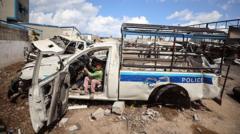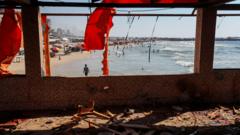A lieutenant colonel in Hamas's security forces revealed to BBC that nearly 80% of the armed group's control over the Gaza Strip has evaporated, attributing this collapse to months of relentless Israeli airstrikes that have decimated Hamas's leadership. Wounded in the initial week of a war ignited by Hamas's attack on Israel on October 7, this officer chose to remain anonymous while sharing voice messages that depict an alarming internal disintegration of Hamas and a breakdown in security.
Hamas Struggles for Control as Clans Rise Amid Chaos in Gaza

Hamas Struggles for Control as Clans Rise Amid Chaos in Gaza
A senior Hamas security officer reports a dramatic loss of authority in Gaza, as armed clans fill the security vacuum left by the group's waning power.
He lamented the almost total destruction of the group's command structure, claiming that "most of the leadership, about 95%, are now dead," and warned that nothing significant prevents Israel from intensifying its military operations. The absence of established security and the rise of rogue armed clans signify a dangerous trend, as remnants of Hamas struggle to maintain order. This shift has left vulnerable citizens at the mercy of criminal factions that could freely impose their will without fear of intervention.
The officer's account indicates that even during previous ceasefires, Hamas attempted to consolidate its power but failed to recover effectively. Revelations include the looting of key security headquarters and a complete collapse of law enforcement capabilities, resulting in rampant gang violence and no semblance of governance.
As Israeli strikes continue to target any semblance of Hamas's operational structure, six local armed groups are reportedly stepping in to assume power. One notable figure among these rivals is Yasser Abu Shabab, who has begun amassing resources and forming alliances with other armed factions. This shift towards clan-based power undermines Hamas's authority and poses a credible threat from within its own territory.
Amid the chaos, reports surface indicating that Abu Shabab may be receiving external support from Israel, further complicating Hamas's plight. With fears mounting that he could unite various factions against Hamas, the group’s precautionary measures include placing a bounty on his head to thwart any organized resistance.
As Gaza descends deeper into lawlessness, the dynamics within Hamas face an existential challenge. Law enforcement capabilities are diminished, rival factions grow ever more influential, and the organization's once-dominant position is under unprecedented pressure from both external forces and internal dissent.
The officer's account indicates that even during previous ceasefires, Hamas attempted to consolidate its power but failed to recover effectively. Revelations include the looting of key security headquarters and a complete collapse of law enforcement capabilities, resulting in rampant gang violence and no semblance of governance.
As Israeli strikes continue to target any semblance of Hamas's operational structure, six local armed groups are reportedly stepping in to assume power. One notable figure among these rivals is Yasser Abu Shabab, who has begun amassing resources and forming alliances with other armed factions. This shift towards clan-based power undermines Hamas's authority and poses a credible threat from within its own territory.
Amid the chaos, reports surface indicating that Abu Shabab may be receiving external support from Israel, further complicating Hamas's plight. With fears mounting that he could unite various factions against Hamas, the group’s precautionary measures include placing a bounty on his head to thwart any organized resistance.
As Gaza descends deeper into lawlessness, the dynamics within Hamas face an existential challenge. Law enforcement capabilities are diminished, rival factions grow ever more influential, and the organization's once-dominant position is under unprecedented pressure from both external forces and internal dissent.


















